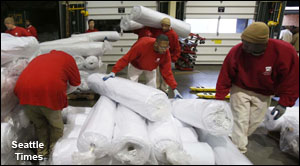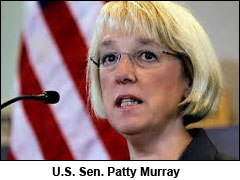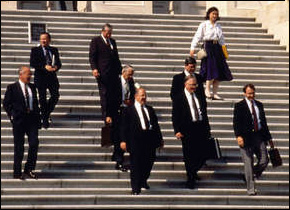NEWS ROUNDUP
Prison labor, Boeing breaks, pension cuts…
Monday, December 15, 2014
PRISON LABOR
 ► “Sell block: The empty promises of prison labor,” a special report in The Seattle Times:
► “Sell block: The empty promises of prison labor,” a special report in The Seattle Times:
Part 1: Broken prison labor system fails to keep promises, costs millions — Today, some 1,600 incarcerated men and women in prison factories produce everything from dorm furniture to school lunches. Washington Correctional Industries (CI) generates up to $70 million in sales a year, ranking as the nation’s fourth-largest prison labor program. But behind CI’s glossy brochures and polished YouTube videos is a broken program that has cost taxpayers millions of dollars, charged exorbitant markups to state agencies to make up for losses, and taken jobs from private businesses that can’t compete with cheap prison labor, a Seattle Times investigation has found.
Part 2: Recycling scheme cost state $1 million — The CI mattress program lost at least $1 million while squeezing out competitors by offering cheap inmate labor to mattress retailers in Seattle and statewide. By law, CI is not allowed to sell the services of inmates to benefit private companies. But CI officials paid a newly formed Arizona nonprofit, based at the home of a former Washington mattress executive, to serve as their money middleman.
STATE GOVERNMENT
► In the (Everett) Herald — Unions want state to prove that Boeing tax breaks work — At issue are aerospace-industry tax breaks extended late last year by lawmakers as part of the state’s effort to convince Boeing to assemble the new 777X airliner here. The company later said it will disperse engineering work on the plane around the country, including design now done in Washington. That has critics, primarily unions, saying the tax-break law lacks teeth. Boeing, they say, can save billions in state taxes but can still ship jobs out of state. They think the law should be amended to require that Boeing show an increase in net employment in Washington in return for the tax exemptions. Such a provision is called a “clawback.” Boeing says tax breaks are critical to expanding the state aerospace sector and that adding reporting requirements would be burdensome.
 ► In today’s (Everett) Herald — Inslee to share budget plan — Gov. Jay Inslee this week will propose raising several billion dollars through new and higher taxes, much of it aimed at public schools and transportation. Over coming days, the state’s Democratic chief executive will hold events to highlight his spending priorities for the second half of his term.
► In today’s (Everett) Herald — Inslee to share budget plan — Gov. Jay Inslee this week will propose raising several billion dollars through new and higher taxes, much of it aimed at public schools and transportation. Over coming days, the state’s Democratic chief executive will hold events to highlight his spending priorities for the second half of his term.
► From KPLU — Ahead of budget rollout, Inslee plugs climate-change plans — The governor touted the benefits of generating state revenues out of efforts to curb pollution during a public appearance Friday, but he stopped short of confirming a carbon tax or cap-and-trade program would be a centerpiece of the budget and policy plans he’ll outline this week.
► In the Olympian — U.S. Supreme Court ruling on home care workers still reverberating in Washington — The rights of Washington state home-care workers to opt out of union membership has become a contentious issue between the right-wing Freedom Foundation and SEIU, which recently negotiated a contract that raises the average hourly pay for care workers to at least $14 by 2017. “To date there has been a very very small percentage of members who have opted out,” SEIU 775 spokesman Jackson Holtz said. “What we see more than anything is that our members are committed to serving the most vulnerable people of our state – older adults and people with disabilities.”
LOCAL
► In the (Everett) Herald — Boeing workers donate $5ooK for job training — Boeing workers gave $500,000 on Friday to HopeWorks Social Enterprises, a nonprofit that is creating businesses in the community to provide job training. It’s the largest capital grant ever given by the Employees Community Fund of Boeing Puget Sound.
► In the Spokesman-Review — Spokane should reconsider vote on apprentices (editorial) — The Spokane City Council should reconsider a scheduled vote on an ordinance that in 2017 would require a minimum 15 percent of workers on city construction projects be apprentices. The proposal is too punitive, relies too much on the judgment of a yet-to-be-hired bureaucrat and addresses a problem contractors are trying to solve without city prodding.
FEDERAL GOVERNMENT
► In The Hill — Senate passes $1.1 trillion budget deal — The Senate voted 56-40 late Saturday evening to pass a $1.1 trillion spending package that funds most of the government through next September. The vote culminates a week of acrimonious sniping and sends the spending bill to President Obama’s desk for a signature.
EDITOR’S NOTE — How Washington’s delegation voted: In the Senate, Murray “yes” and Cantwell “no.” In the House, Hastings, Herrera Beautler, McMorris Rodgers, and Reichert voted “yes.” DelBene, Heck, Kilmer, Larsen, and McDermott voted “no.” Smith did not vote.
 ► In the Tri-City Herald — Restored Hanford budget passes Senate — Sen. Murray voted for the bill, saying she fought to make sure that the bill included key state priorities, including money for Hanford cleanup, schools, roads, worker training, and care and support of veterans and service members. However, she strongly opposed certain provisions in the bill, saying they undercut Wall Street reform, could increase health care premiums, and open the door for reductions in pension benefits.
► In the Tri-City Herald — Restored Hanford budget passes Senate — Sen. Murray voted for the bill, saying she fought to make sure that the bill included key state priorities, including money for Hanford cleanup, schools, roads, worker training, and care and support of veterans and service members. However, she strongly opposed certain provisions in the bill, saying they undercut Wall Street reform, could increase health care premiums, and open the door for reductions in pension benefits.
► In the WSJ — Pension bill seen as model for future cuts — A measure included in Congress’s mammoth spending bill permits benefit cuts for retirees in one type of pension plan, a big shift that lawmakers and others believe could set a precedent for other troubled retirement programs… Lawmakers and experts, while divided over the merits of the change, largely agreed that it could well be the first of many.
► In today’s Washington Post — Battle over spending bill exposes Democratic rift — Sen. Elizabeth Warren, who entered Congress with a liberal halo of anti-Wall Street credibility, took her most high-profile and tenacious Senate stand last week over a single provision in a $1.1 trillion spending bill, one that would roll back portions of the 2010 Dodd-Frank Act, the financial industry regulatory law.
 ► In today’s NY Times — Wall Street’s revenge (by Paul Krugman) — What Congress did is outrageous — and both sides of the ideological divide should agree. After all, even if you believe (in defiance of the lessons of history) that financial institutions can be trusted to police themselves, even if you believe the grotesquely false narrative that bleeding-heart liberals caused the financial crisis by pressuring banks to lend to poor people, especially minority borrowers, you should be against letting Wall Street play games with government-guaranteed funds. What just went down isn’t about free-market economics; it’s pure crony capitalism. And sure enough, Citigroup literally wrote the deregulation language that was inserted into the funding bill.
► In today’s NY Times — Wall Street’s revenge (by Paul Krugman) — What Congress did is outrageous — and both sides of the ideological divide should agree. After all, even if you believe (in defiance of the lessons of history) that financial institutions can be trusted to police themselves, even if you believe the grotesquely false narrative that bleeding-heart liberals caused the financial crisis by pressuring banks to lend to poor people, especially minority borrowers, you should be against letting Wall Street play games with government-guaranteed funds. What just went down isn’t about free-market economics; it’s pure crony capitalism. And sure enough, Citigroup literally wrote the deregulation language that was inserted into the funding bill.
► A related story in The Hill — Poll: Congress’s job approval rating stuck near record low — In the past year, an average 15% of Americans said they approved of the job that Congress was doing. A record-low 14% said they approved last year.
NATIONAL
 ► At Politico — NLRB boosts unions’ organizing leverage — In the most significant policy change ever undertaken by the Obama administration to strengthen the power of labor unions, a divided National Labor Relations Board issued a long-awaited final rule speeding up the union election process. The rule will require businesses to postpone virtually all litigation over eligibility issues until after workers vote on whether to join the union, thereby depriving management of a stall tactic that unions widely claim benefits the employer. In effect, regional NLRB directors will be given broad discretion to rule such litigation unnecessary until an election takes place.
► At Politico — NLRB boosts unions’ organizing leverage — In the most significant policy change ever undertaken by the Obama administration to strengthen the power of labor unions, a divided National Labor Relations Board issued a long-awaited final rule speeding up the union election process. The rule will require businesses to postpone virtually all litigation over eligibility issues until after workers vote on whether to join the union, thereby depriving management of a stall tactic that unions widely claim benefits the employer. In effect, regional NLRB directors will be given broad discretion to rule such litigation unnecessary until an election takes place.
► At Huffington Post — Your boss can’t stop you from organizing a union over work email, feds say — In a significant win for labor unions, federal regulators ruled Thursday that employers can’t prevent their workers from using company email to organize and discuss their working conditions outside of work.
TODAY’S MUST-READ
► At Politico — The devalued American worker — The American economy has stopped delivering the broadly shared prosperity that the nation grew accustomed to after World War II. The explanation for why that is begins with the millions of middle-class jobs that vanished over the past 25 years, and with what happened to the men and women who once held those jobs. Millions of Americans are working harder than ever just to keep from falling behind. Those workers have been devalued in the eyes of the economy, pushed into jobs that pay them much less than the ones they once had.
The Stand posts links to Washington state and national news of interest every weekday morning by 10 a.m.





